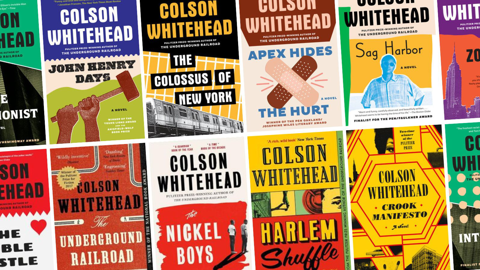Stuck on which one of Colson Whitehead's books to read? We've got you covered with this quick overview of the two time Pulitzer Prize-winning writer's back catalogue.
Colson Whitehead’s writing style defies categorisation. Renowned for his ability to play with genre, his 11 books span a wide range of genres, from post-apocalyptic fiction to coming-of-age, mystery, memoir, literary fiction, crime, and magical realism.
As Whitehead told Teachers and Writers Magazine in 2003: ‘From book to book I want to do something different. If I know it’s going to be hard, that makes me want to do it.... Not knowing if you can do it makes the work better because you’re always second-guessing yourself, making sure you’re doing the best work you can – not coasting.’
This subversion of literary expectations is part of what makes the prospect of a new Whitehead novel so exciting – but with such a diversity of writing, it can be hard to know where to begin.
Ahead of his visit to Melbourne for World of Words next month, we’ve compiled a guide to the Colson Whitehead oeuvre to help you choose which story to embark on first – or next!
Harlem Shuffle (2021)

Told from the perspective of furniture salesman (and sometime reluctant criminal) Ray Carney, Harlem Shuffle is a crime caper with a historical drama twist. Whitehead's most recent novel is the first installment of the Harlem Trilogy; the second, Crook Manifesto, will be published in July.
Zone One (2011)

This wry and chilling novel explores the zombie apocalypse as only Colson Whitehead can. As he told Goodreads, Zone One was his way of 'paying back the debt' he felt was owed to the science fiction and horror writers he loved reading growing up.
The Underground Railroad (2016)

A blend of historical fiction and magical realism, The Underground Railroad put Whitehead’s name on the international literary map and has arguably become his most famous work. Exploring the horrors of slavery in the American South, the novel won a Pulitzer Prize for its powerful and moving portrayal of this dark chapter in American history. The novel has since been adapted into a Golden Globe and BAFTA award-winning miniseries, directed by Barry Jenkins.
The Nickel Boys (2019)

Set in segregated Florida during the Jim Crow era, The Nickel Boys was praised for its biting social commentary. It won Whitehead his second Pulitzer Prize, with the judges describing it as 'a spare and devastating exploration of abuse … that is ultimately a powerful tale of human perseverance, dignity and redemption’.. Whitehead is only the fourth writer to be awarded the prize twice. An film adaptation of The Nickel Boys is currently under development.
John Henry Days (2001)

Another historical fiction novel, John Henry Days draws on the legend of John Henry, an African American steel worker who is believed to have died while competing against a steam drill. Told through multiple perspectives, John Henry Days is a thought-provoking exploration of American identity and culture.
Sag Harbor (2009)

For readers looking for a coming-of-age story, Whitehead's semi-autobiographical novel Sag Harbor is must-read. Set in 1985 in a summer vacation spot for affluent black families, Sag Harbor explores the complexities of growing up and finding one's place in the world.
The Intuitionist (1999)

Whitehead's first novel is a comic fantasy/quasi detective novel set in the elevator inspector industry. Earning comparisons to satirical classics such as Catch-22 and The Crying of Lot 49, Whitehead described the book as a ‘very extravagant and baroque metaphor about racial uplift’.
Apex Hides the Hurt (2006)

A work of cultural satire and an incisive commentary on branding and identity politics in America, this novel follows the story of a community who hire an expert on nomenclature – the system for giving names to things within a particular profession or field – to help them rebrand their town.
The Noble Hustle: Poker, Beef Jerky and Death (2014)

In this memoir, Whitehead lifts the curtain on the 2011 World Series of Poker in Las Vegas – in which he participated as a casual poker player. The result is a fascinating and witty account of his experiences in the world of high-stakes poker.
The Colossus of New York (2003)

An evocative portrait of Whitehead's beloved hometown. Distinguished by its poetic style, The Colossus of New York is told in fragments, each serving as a snapshot of the city and its people.
Colson Whitehead will be in conversation with Santilla Chingaipe at The Capitol on Wednesday 24 May for the Wheeler Centre's World of Words, a new international writers series.
